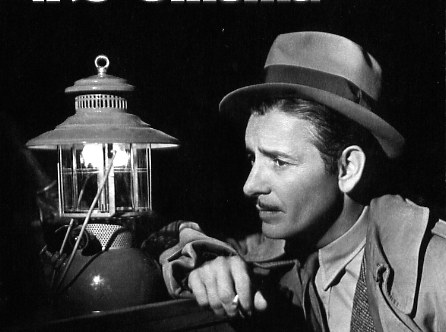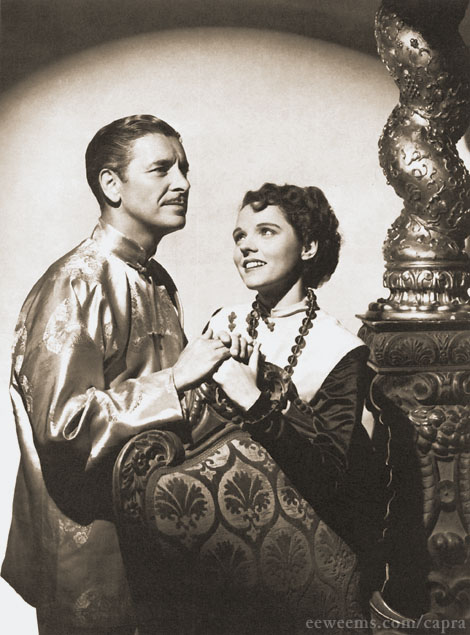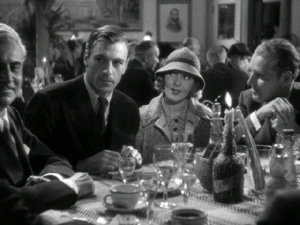I just watched You Can't Take It With You with my daughter, who has never seen it. It makes sense that I should start a Frank Capra thread, yes? The Similar Thread Doohickey said it was OK. 

Frank Capra was born in Sicily, and his family immigrated to America when he was six. His age would be pretty much comparable to that of Don Corleone (from The Godfather) when his family migrated to NYC, although the Don was probably a little bit older. Capra actually enlisted in the U.S. Army in 1918, but illness prevented him from ever leaving the country. His family moved to Los Angeles, and he was naturalized in 1920 and went to work at the film studios as a prop man. It didn't take him that long before he was directing silent films with Harry Langdon and then some war adventure films involving submarines and dirigibles.

Eventually Capra became the Saviour of the low-budget Columbia Studios and soon enough, he found himself the most popular filmmaker of the Depression era. His films were so wildly popular that he was seen as the forerunner of that AntiChrist, Steven Spielberg. Capra's films were definitely populist, and even if he truly believed in the American Dream, he could tell that a land where few were rich and many were poor would quickly become a poor country, at least spiritually, so sometimes, he's considered a socialist. His attacks on big business are well-known, but when he, and his main screenwriter, Robert Riskin, present their points so cogently, it's difficult for anyone to cheer the capitalist who wants to crush the common citizen just to make a few extra million dollars which he will never ever need. Capra's films do tend to be fables presented to a country of poor people to enable them to follow their own Muse. However, I'm quite sure that if the U.S. moviegoers didn't have the same hopes as those of the characters in Capra films that our wonderful country may have had a much more difficult time during the 1930s, and then we would have been even less prepared for our involvement in World War II. As a sidenote, Capra was a President of the Academy of Motion Picture Arts and Sciences and used his position to advance the nomination process, including allowing foreign-language films and honoring supporting actors.
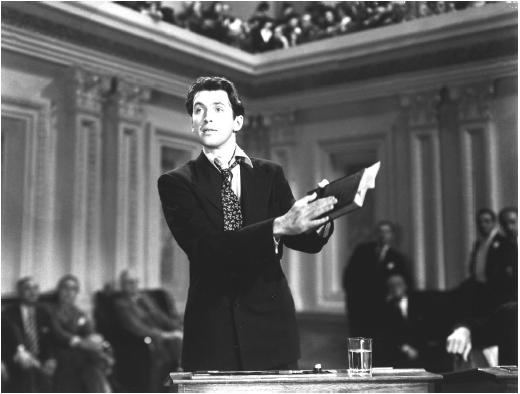
Anybody who is crazy enough to question Frank Capra's patriotism should be told, here and now, that he rejoined the Army in 1941 and went on some of the most dangerous missions of WWII. The results? The incredible Why We Fight series of films, which he supervised, photographed and edited, and which were shown to the public in the U.S. and the U.K. during the war. After the war, Capra made what turned out, in retrospect, to be his most popular film, It's a Wonderful Life (early revisionism), and he made an equally significant political satire, State of the Union, which may will be Tracy and Hepburn's best film together. Capra continued to make films up to the '60s, but they never met with the acclaim or popularity of his earlier films, and he even remade two of his lesser-known, but better, films (Lady For a Day and Broadway Bill) in the final decade of his career.
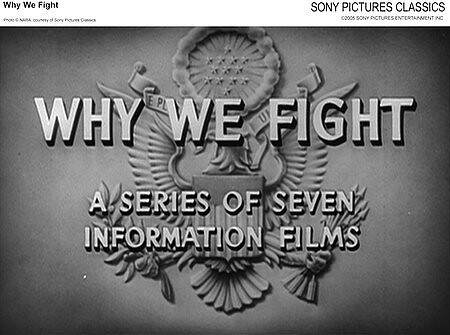
Capra died in 1991, 30 years after he directed his final film. Even so, anyone who is a true film buff would find most any of his films, especially those made from 1931 to 1948, as essential examples of films with strong plots, characters and incredible craftsmanship. Some of his earlier and later films are well worth watching, but not until you avail yourself to such masterpieces as The Bitter Tea of General Yen, It Happened One Night, Mr. Deeds Goes to Town, Lost Horizon, Mr. Smith Goes to Washington, Meet John Doe and Arsenic and Old Lace. My next post will discuss You Can't Take It With You, a film which won Best Picture and Best Director in 1938 (Capra won three Best Director Oscars in the 1930s). Hopefully, somebody else has watched Capra and has an opinion, even if it's different from mine.



Frank Capra was born in Sicily, and his family immigrated to America when he was six. His age would be pretty much comparable to that of Don Corleone (from The Godfather) when his family migrated to NYC, although the Don was probably a little bit older. Capra actually enlisted in the U.S. Army in 1918, but illness prevented him from ever leaving the country. His family moved to Los Angeles, and he was naturalized in 1920 and went to work at the film studios as a prop man. It didn't take him that long before he was directing silent films with Harry Langdon and then some war adventure films involving submarines and dirigibles.

Eventually Capra became the Saviour of the low-budget Columbia Studios and soon enough, he found himself the most popular filmmaker of the Depression era. His films were so wildly popular that he was seen as the forerunner of that AntiChrist, Steven Spielberg. Capra's films were definitely populist, and even if he truly believed in the American Dream, he could tell that a land where few were rich and many were poor would quickly become a poor country, at least spiritually, so sometimes, he's considered a socialist. His attacks on big business are well-known, but when he, and his main screenwriter, Robert Riskin, present their points so cogently, it's difficult for anyone to cheer the capitalist who wants to crush the common citizen just to make a few extra million dollars which he will never ever need. Capra's films do tend to be fables presented to a country of poor people to enable them to follow their own Muse. However, I'm quite sure that if the U.S. moviegoers didn't have the same hopes as those of the characters in Capra films that our wonderful country may have had a much more difficult time during the 1930s, and then we would have been even less prepared for our involvement in World War II. As a sidenote, Capra was a President of the Academy of Motion Picture Arts and Sciences and used his position to advance the nomination process, including allowing foreign-language films and honoring supporting actors.

Anybody who is crazy enough to question Frank Capra's patriotism should be told, here and now, that he rejoined the Army in 1941 and went on some of the most dangerous missions of WWII. The results? The incredible Why We Fight series of films, which he supervised, photographed and edited, and which were shown to the public in the U.S. and the U.K. during the war. After the war, Capra made what turned out, in retrospect, to be his most popular film, It's a Wonderful Life (early revisionism), and he made an equally significant political satire, State of the Union, which may will be Tracy and Hepburn's best film together. Capra continued to make films up to the '60s, but they never met with the acclaim or popularity of his earlier films, and he even remade two of his lesser-known, but better, films (Lady For a Day and Broadway Bill) in the final decade of his career.

Capra died in 1991, 30 years after he directed his final film. Even so, anyone who is a true film buff would find most any of his films, especially those made from 1931 to 1948, as essential examples of films with strong plots, characters and incredible craftsmanship. Some of his earlier and later films are well worth watching, but not until you avail yourself to such masterpieces as The Bitter Tea of General Yen, It Happened One Night, Mr. Deeds Goes to Town, Lost Horizon, Mr. Smith Goes to Washington, Meet John Doe and Arsenic and Old Lace. My next post will discuss You Can't Take It With You, a film which won Best Picture and Best Director in 1938 (Capra won three Best Director Oscars in the 1930s). Hopefully, somebody else has watched Capra and has an opinion, even if it's different from mine.


__________________
It's what you learn after you know it all that counts. - John Wooden
My IMDb page
It's what you learn after you know it all that counts. - John Wooden
My IMDb page

